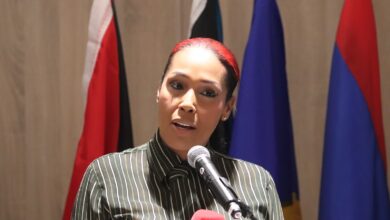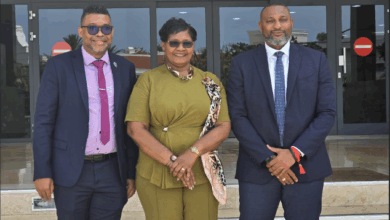(CARICOM Secretariat, Turkeyen, Greater Georgetown, Guyana) Caribbean Community (CARICOM) representatives at the United Nations (UN) Climate Change Conference 2007 in Bali, Indonesia, which ended on Friday 14 December, continued their engagement with the international community to address the projected harmful consequences of climate change.
The Region was represented by Antigua and Barbuda, The Bahamas, Barbados, Belize, Dominica, Grenada, Guyana, Haiti, Jamaica, Saint Kitts and Nevis, Saint Lucia, Saint Vincent and the Grenadines, Suriname, and Trinidad and Tobago. Included among the delegations were four Government Ministers and high-level representatives from the CARICOM Secretariat, led by Assistant Secretary-General Trade and Economic Integration, Ambassador Irwin LaRocque, and the Caribbean Community Climate Change Centre (CCCCC)
The Centre sponsored a Side Event on `Capacity Building for Climate Change Adaptation – Caribbean Experience’ at the Conference which not only demonstrated the impacts of Climate Change on the Caribbean but, more importantly, highlighted the coping mechanisms the Region has been developing to address climate change.
The Bali Conference focused on a set of ground rules and benchmarks to initiate the next two years of negotiations for a post-2012 multilateral agreement on climate change. At the Conference, much emphasis was given to concluding an agreement that includes a strict timetable and inter-sessional meetings to complete negotiations by 2009, and to ensure enough time to ratify the post-2012 agreement before the first commitment period of the Kyoto Protocol expires in that year.
Among the principal issues addressed at the Conference were the modalities to keep global average temperature rise as far as possible below two degrees centigrade relative to pre-industrial levels to prevent dangerous changes in the climate system, and the translation and application of the UN Framework Convention on Climate Change (UNFCCC)’s principle of “common but differentiated responsibilities” into clear and fair criteria. These criteria include the polluter pays principle, binding emission targets, the role of industrial countries in adopting strong and aggressive action consistent with their level of development to fulfill their obligations under the Convention, and consideration of a range of mechanisms to assist developing countries to address the negative consequences of climate change.
CARICOM Member States, in articulating their positions at the Conference, highlighted the importance of: the establishment and implementation of an Adaptation Fund to assist developing countries to build resilience and adaptive capacity. Among the objectives of the Fund is the provision of a more consistent, predictable and substantial source of funding.
CARICOM also spoke to the need for the international community to fix the loopholes in the Clean Development Mechanism, which are undermining the environmental integrity of the scheme by generating windfall profits for an increasing number of industrial greenhouse gas emitters.
Further, Member States made a call for new policies and incentives to be a central part of the negotiations with respect to the development of mechanisms to Reduce Emissions from Deforestation and Degradation (REDD). Existing initiatives to reduce deforestation have failed to achieve large scale forest conservation.
Strong calls were also made for the sharing of clean technology which has the potential to reduce emissions growth in developing countries at low cost. Some Member States emphasised the importance of the removal of barriers to sharing of clean technology and the establishment of strong obligations for developed countries to share expertise, training and technology with developing countries.
Negotiations at the Bali Conference have been complex, intense and largely deadlocked on almost every issue. However, a major breakthrough on the Adaptation Fund and a REDD scheme to assist developing countries to stop deforestation breathed new life into the negotiations on a Bali Mandate.





